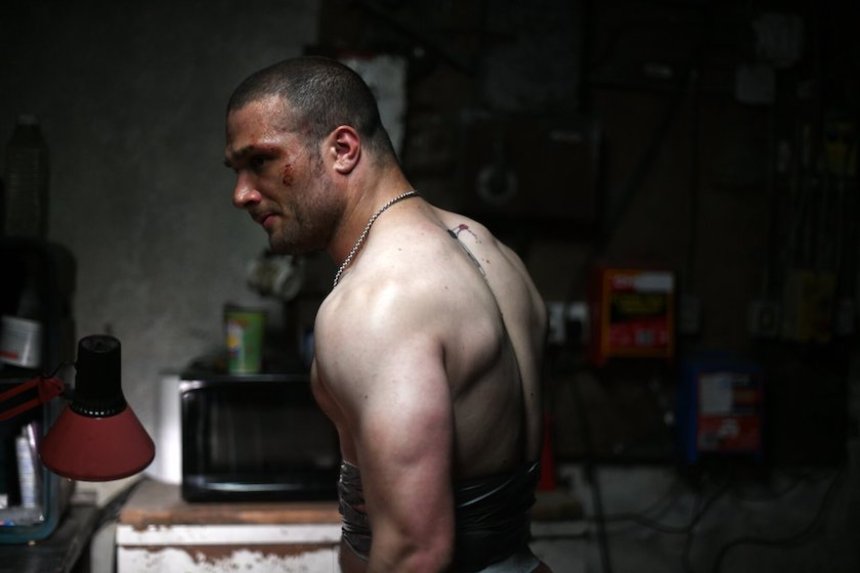Review: THE SHADOW OF VIOLENCE, Fresh, Original Take on Toxic Masculinity
Cosmo Jarvis, Barry Keoghan, and Liam Carney star in director Nick Rowland's crime drama.

Noir is alive and well in The Shadow of Violence (aka Calm with Horses), a grim and gritty, if often derivative and unoriginal, crime drama adapted by Joe Murtagh (American Animals) from Colin Barrett’s novella and helmed by first-time director Nick Rowland.
With jobs scarce and empathy scarcer in economically and culturally depressed rural Ireland, there’s little for a down-and-out ex-boxer like Douglas “Arm” Armstrong (Cosmo Jarvis) to do except turn to a life of crime as a bone-breaking, arm-twisting enforcer for the local drug-dealing Devers clan. The Devers recruit Arm at his most vulnerable ― after he kills another boxer in the ring ― promising Arm not just economic security, but a “family” of his own, built not just on blood, but on the kind of brutal, brutalizing loyalty that convert men like Arm into the amoral, conscienceless thugs they need to run their business.
But like any noir anti-hero, Arm still has a conscience. He even has a sensitive, poetic soul, the kind of sensitive, poetic soul that works best on the written page where a clever writer can use his or her rhetorical skills to convince readers of the complex interior landscape of an ex-boxer-turned-enforcer’s life.
It’s much harder to accomplish on film where ― outside of the introspective voiceover that opens The Shadow of Violence ― filmmakers have to convince audiences through a combination of visual language, realistic dialogue, and convincing performances, all while sidestepping or avoiding over-familiar genre tropes or narrative conventions. That Rowland actually half-succeeds in turning Arm from a collection of literary tics, preferences, and biases into the onscreen equivalent of a fully fleshed-out, three-dimensional character deserves some kind of credit or recognition beyond the usual participation trophy metaphorically handed out for putting a relatively compelling, coherent film together.
Much of that credit belongs to the cast, starting, but certainly not ending, with Cosmo Jarvis as the thick-necked, hulking, tracksuit-wearing Arm. A living, breathing blunt objection of malice and violence, Arm could be related to any of a half-dozen or more cinematic or literary characters (Robert DeNiro’s in Raging Bull or more recently, Matthias Schoenaerts in The Mustang come to mind), driven less by rage at the world than an inability to find a way through and around the world without using his body for violence.
He’s trapped by social and cultural circumstances that severely limit possibilities, including an alternative to a form of masculinity that also doesn’t involve violence. Arm’s tragedy isn’t, however, that he can’t see beyond the violence that’s defined and constrained his life. It’s that he can and ultimately pays the price for his desire to break away from those toxic norms.
Barry Keoghan (Dunkirk, The Killing of a Sacred Deer) gives Dympna, the youngest member of the Devers crime clan, just enough self-awareness to elevate Dympna from caricature to character. While he’s not a tragic figure like Arm, Dympna is also trapped, trapped by a family that only knows crime, violence, and obedience to Dympna’s uncles, Hector (David Wilmot) and
Paudi (Ned Dennehy). Ambitious, but also aware of his limitations ― he uses Arm as his personal enforcer and bodyguard when he can’t finish a bar fight he’s started ― Dympna’s eventual looks almost as bleak and dark as Arm’s if he goes against the family’s wishes.
A minor manipulator, Dympna uses Arm’s seemingly unwavering loyalty towards the family and his emotional vulnerability, specifically Arm’s unsettled relationship with his ex-girlfriend, Ursula (Niamh Algar) and the autistic son they share, Jack (Kiljan Tyr Moroney), to keep Arm in check, repeatedly attempting to drive a wedge between Arm and Ursula.
As a character, Ursula could have been easily written as just another plot device, there to remind Arm of his humanity and everything he’s lost or about to lose by remaining loyal to the Devers or as the woman-in-jeopardy in the third act who spurs Arm into another, possibly cathartic bout of bloodletting, but Rowland and Murtagh give her just enough nuance, just enough depth, just enough self-awareness that she’s not just a prop for Arm’s journey, but on a self-realizing journey of her own (literally, as the final shot indicates). Niamh Algar leans hard into giving Ursula agency above and beyond Murtagh’s occasionally limited, perfunctory dialogue, adding impressive levels of shade and subtlety to her line readings and consequently to her performance.
Ultimately, of course, The Shadow of Violence belongs to Cosmo Jarvis and Arm, turning on the limits of Arm’s morality and whether, if and when asked, he’ll eliminate the man, Fannigan (Liam Carney), who sexually assaulted a teenaged member of the Devers family. The brutal beating Arm gives Fannigan proves insufficient to assuage the unquenchable bloodlust of the elder Devers. They want him dead and pass the responsibility for his murder to Dympna and Arm.
The Shadow of Violence pivots on Arm’s impossible choice. Once made, Arm’s decision can’t be unmade or rectified, leaving only whether Arm lives or dies as a consequence. It’s there that The Shadow of Violence shakes off well-worn cliches and genre conventions and turns into a provocative, poignant character study.
Reportedly, the film is now playing in select US theaters via distributor Saban Films.







